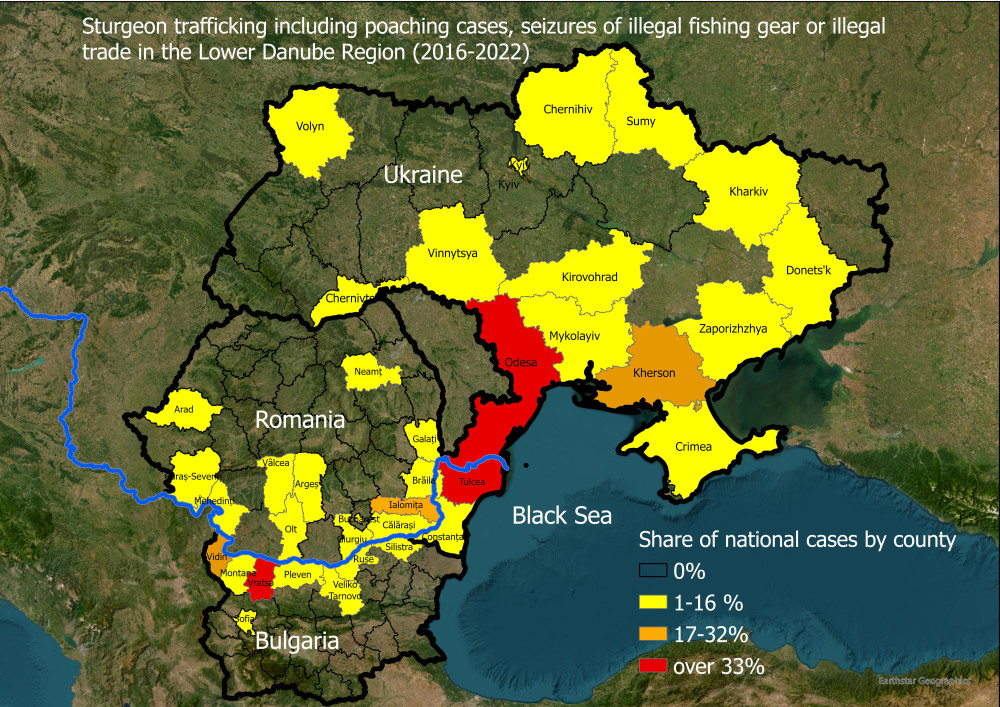The report, a unique endeavor that compiles data across Bulgaria, Romania, and Ukraine, is the only one of its kind examining the regional problem of sturgeon populations that migrate between these countries.
With 337 cases of illegal activities involving sturgeon recorded between 2016 and 2022, the study highlights the risk to the four remaining species in the lower Danube - three of which are Critically Endangered (the beluga, the stellate and the Russian sturgeon), while the other, the sterlet, was upgraded to Endangered last year. The study includes 130 cases from Bulgaria, 125 from Romania, and 82 from Ukraine, ranging from violations of fishing bans and regulations, seizures of illegal fishing gear, and the illicit trade of sturgeon and sturgeon-based products.
"These alarming figures prove that poaching and illegal trade of wild sturgeon continues across the Lower Danube, undermining efforts to save these iconic fish - especially as we know that many more sturgeon crimes go unreported," said Beate Striebel, WWF Sturgeon Initiative Lead. "Sturgeon have swum in the Danube for millions of years but we will lose them forever if we can't halt the illegal catches and trade of wild caviar and meat."
Highlighting the severity of the situation, a minimum of 955 sturgeon specimens were seized in total - with 3 in Bulgaria, 553 in Romania, and 399 in Ukraine. Yet this is only the tip of a much larger undetected iceberg, underlining the destructive impact of poaching and illegal trade on the last remaining wild sturgeon stocks. Vratsa in Bulgaria, Tulcea in Romania, and Odesa in Ukraine emerged as the main hotspots - representing over 1/3rd of reported cases in each country.
 |
"This report is a clarion call for action - a reminder of the urgent need for countries and organisations to scale up efforts to halt sturgeon crime along the Danube. WWF has been working with governments, partners and communities to tackle poaching and illegal trade, but clearly much more needs to be done,” added Beate Striebel.
WWF's efforts to curb this illegal activity include developing innovative approaches to aid enforcement authorities, many of whom lack sufficient capacity. In Romania, successful methods include using camera traps, which discovered at least 15 illegal activities, as well as testing drone surveillance over the vast area of the Romanian Danube Delta.
In Bulgaria, WWF collaborated with the Bulgarian border police to successfully utilise underwater sonar equipment. The innovative adaptation of this technology aids in the detection of karmaci, a traditional, yet illegal, hook line used for sturgeon fishing. Despite being hard to detect due to their sub-surface placement, sonars have facilitated the discovery of 131 karmaci in 2022 alone, marking significant progress regardless of the ongoing challenges in extraction and confiscation.
The report underscores the importance of continued and strengthened enforcement efforts. It also discusses potentially involved corruption issues, with a case from Ukraine that made transparent a system of bribery by fishermen to officials from the fishing authorities.
The data compiled by WWF is crucial, as it provides the only publicly available compilation of such information for the Lower Danube region. The stakeholders, including law enforcement authorities, wildlife conservation workers, and even the consumers of illegal meat and caviar of wild source, all must understand that action or inaction in one country directly affects the shared sturgeon populations.
Beate Striebel, expresses cautious optimism: "On a positive note we observe more interest and investments from various organisations, particularly EU funds, into sturgeon conservation. But the success of all these efforts will depend on whether we can eventually stop the poaching of these precious animals."
For more information, please contact Beate Striebel-Greiter, WWF Sturgeon Initiative lead, bstriebel@wwfcee.org, WWF sturgeon initiative


